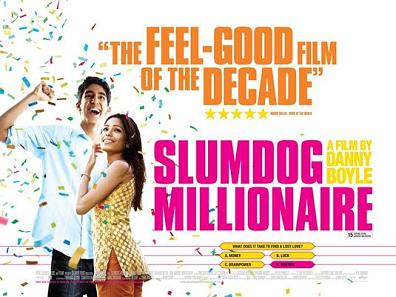 A few thoughts on the 2008 winner for best picture, Slumdog Millionaire:
A few thoughts on the 2008 winner for best picture, Slumdog Millionaire:
First off, whenever I think about Slumdog Millionaire, it’s impossible for me not to think of that episode of The Office where Holly and Michael do an homage to the film at the Dunder Miflin company picnic and, along with traumatizing all of the children in the audience, they also manage to accidentally reveal that half of the employees at the picnic are about to get laid off. If you need to know just how successful Slumdog Millionaire was here in the United States, just consider that it was popular enough to be parodied by Michael Scott.
Secondly, as I sit here thinking about what I want to say about the film itself, I find myself wondering if it’s really necessary for me to rehash the film’s plot. I mean, everyone’s seen this movie, right? It was released 7 years ago. It won a bunch of Oscars. It’s on cable constantly! I mean, everyone already knows what happens, right?
Oh, really? Okay, apparently there’s one person out there who has never seen Slumdog Millionaire.
For his benefit, I will reveal that Slumdog Millionaire is a British-made film about India. Jamal (Dev Patel) is an 18 year-old telemarketer, who works from India and calls people in Scotland, reading from a script and saying things like, “I really love Sean Connery.” When Jamal is selected to compete on the Indian version of Who Wants To Be A Millionaire, he shocks both the audience and the show’s producers by getting every answer right. However, before he can answer the final question and potentially become a millionaire, he is taken into a backroom and tortured by the police, who are convinced that a “slumdog” like Jamal couldn’t possibly know all the answers. As Jamal explains how he knew each answer, the film flashes back to Jamal’s childhood in the slums of Bombay.
It’s during these flashbacks that we see how Jamal — and thousands of other poor children like him — were forced by local gangsters to work as beggars. (In one extremely harrowing scene, a child is blinded specifically so he’ll be a more sympathetic beggar.) While Jamal eventually escapes this life, his brother Salim (Madhur Mittal) and his childhood love, Latika (Freida Pinto) remain under the power of a cruel crime boss (Mahesh Manjrekar).
So, that’s a relatively spoiler-free plot outline of Slumdog Millionaire. You’re welcome.
Now, personally, I love Slumdog Millionaire but a lot of people don’t. It seems to be one of those films that always gets mentioned when certain people talk about unworthy Oscar winners. Some of that is because Slumdog Millionaire won best picture the same year that The Dark Knight was not even nominated. In the eyes of some, being upset over the snubbing of The Dark Knight means that you’re also required to insanely resent every film that was not snubbed. (Looking in your direction, Sasha Stone…) But even more of the anti-Slumdog sentiment seems to come from the fact that the plot of Slumdog Millionaire revolves around an episode of Who Wants To Be A Millionaire. They feel that Slumdog Millionaire is essentially a feature-length commercial for a game show.
However, I think those people are overlooking one very important detail. In Slumdog Millionaire, How To Be A Millionaire is not portrayed in the most positive light. The whole plot of the film, after all, is that, as a result of doing well on the show, Jamal was taken into a dank room and tortured! You have to wonder what went on behind the scenes on the American version of the show.
The film’s poster refers to Slumdog Millionaire as being “the feel good film of the decade.” I don’t know if I’d agree with that description. It’s a fun film to watch because Danny Boyle is one of those hyperactive directors who can make anything fun. But, at the same time, Slumdog Millionaire is a pretty dark film. Happy ending or not, the majority of the film is about children living in extreme poverty and being exploited by rich sadists.
For those who would complain that Slumdog Millionaire gets a bit too melodramatic for its own good — well, can you ever really be too melodramatic? Along with everything else, Boyle meant for Slumdog Millionaire to serve as an homage to the famously melodramatic cinematic conventions of Bollywood and he largely succeeds.
And, of course, there’s the final dance number!
Seriously, how can you note love that?